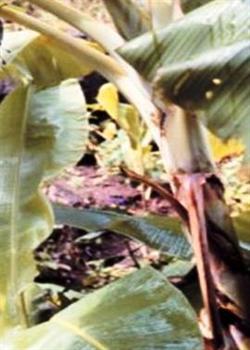National Institute for Inter-disciplinary Science and Technology (NIIST), one of the constituent laboratories of Council of Scientific and Industrial Research (CSIR), has developed a technology for clean extraction of banana fibre from pseudo stems (leftover banana trunk after harvest) and empty bunches.

Banana fibre is in good demand all over the world and is used to make textiles, yarn, paper and paper cups, cordage, tea bags, handbags, and footwear. Conventionally, Banana fibre is extracted through a cumbersome manual process, wherein the pseudo stem sheaths are scraped and the fibre is separated by using a metal scraper (flat and blunt blade).
An individual at work can expect to extract just about 500 gm in this manner. An alternate route is by a mechanical process, which yields 10 times the quantity but with heavy damage to the fibre.
The technology developed by CSIR-NIIST involves an anaerobic (without oxygen) process mediated through microbial action. Banana pseudo stems and empty bunches are soaked in a tank and for four to six days and the soak liquor is circulated through an attached anaerobic reactor. The fibres are separated by enzymes produced in-situ through microbial action in an anaerobic reactor.
During the process pectin, the intercellular cementing substance present around the fibres is degraded. This results in the separation of fibres from their embedding. The best operational conditions for fibre extraction through the anaerobic process are temperature between 20 to 37 C and neutral pH of 6.7 to 8.00. During the anaerobic process, volatile fatty acids are generated from the degradation of molecules such as sugars and galacturonic acid (a degradation product of pectin). This Volatile Fatty Acids (VFAs) are not accumulated in the system because of the growth of methanogenic bacteria that convert the short chain organic acids into methane and thus removed simultaneously. Hence the organic wastes get converted into biogas in the process. The process water is recirculated.
Under optimum conditions, separation of the fibres gets completed in a week's time. The fibres are then water-washed and dried in sunlight to bring down the moisture content to less than 15%. Fibre thus obtained is brilliant white in colour and has little pith residues. The anaerobic process is also inexpensive and pollution-free. There is no damage caused to fibre extracted through this process.
The technology developed by CSIR-NIIST also has the potential to generate employment and can offer higher earnings for farmers. An international patent application also has been filed for the invention through PCT route.





